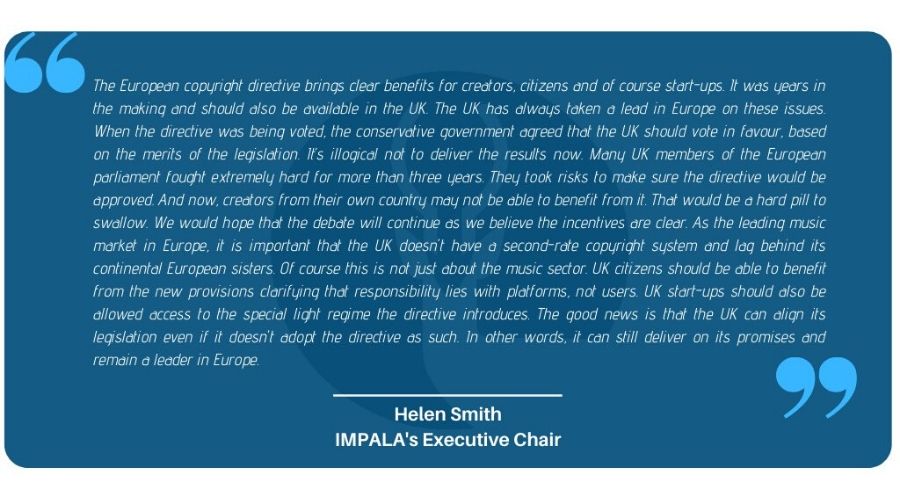29/01/2020

Today marks the official start of Brexit. The UK and the EU will now negotiate the exact terms upon which they part company.
This means constructing a new deal to avoid disadvantaging the UK/EU trading relationship. IMPALA’s Executive Chair Helen Smith did an interview earlier this week on what the situation is until a new agreement is negotiated, and what the priorities should be for the negotiators in the next phase.
Helen Smith commented: “A sector specific approach is essential to ensure ongoing terms accommodate the needs and opportunities of the cultural sectors in a post Brexit world.”
IMPALA has underlined that the next step is crucial and has supported recommendations across the European cultural sectors.
Smith continued: “This is particularly key for small businesses and emerging artists, who won’t have the means to work their way around complex barriers. If we want an illustration of why that’s important, we just need to look at IMPALA’s album of the year shortlist published yesterday. That is the diversity we want to continue to see crossing borders. Brexit will not prevent that, the independents’ voice will keep being heard.”
The UK’s recent stance on the EU’s copyright directive has caused concern in the music sector and IMPALA commented on this earlier this week. Even if it doesn’t adopt the directive as such, the UK can still align its legislation, deliver on its promises and remain a leader in Europe.
Smith concluded: “We urge both the UK and the EU to prioritise concrete terms that recognise that the European music market is borderless in nature and needs nurturing with sector-specific deal terms.”
The European copyright directive brings clear benefits for creators, citizens and of course start-ups. It was years in the making and should also be available in the UK.
The UK has always taken a lead in Europe on these issues. When the directive was being voted, the conservative government agreed that the UK should vote in favour, based on the merits of the legislation. It’s illogical not to deliver the results now.
Many UK members of the European parliament fought extremely hard for more than three years. They took risks to make sure the directive would be approved. And now, creators from their own country may not be able to benefit from it. That would be a hard pill to swallow.
We would hope that the debate will continue as we believe the incentives are clear. As the leading music market in Europe, it is important that the UK doesn’t have a second-rate copyright system and lag behind its continental European sisters.
Of course this is not just about the music sector. UK citizens should be able to benefit from the new provisions clarifying that responsibility lies with platforms, not users. UK start-ups should also be allowed access to the special light regime the directive introduces.
The good news is that the UK can align its legislation even if it doesn’t adopt the directive as such. In other words, it can still deliver on its promises and remain a leader in Europe.
Worldwide independent music community calls for joined-up approach on GenAI through high More
IMPALA, the European organisation for independent music companies and national associations, launched More
La delegación encabezada por la CEO de WIN, Noemí Planas, y su More